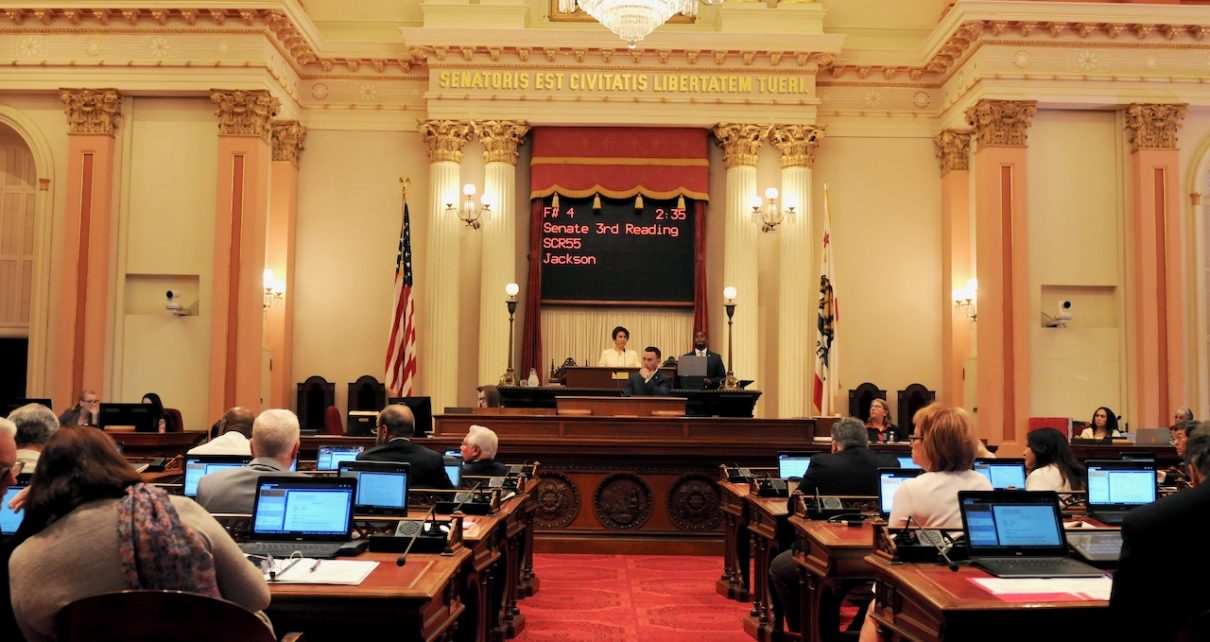
California State Senate. (Photo: Kevin Sanders for California Globe)
Do Governors Allow Bills to Become Law Without Their Signature?
Three options are set forth in the California Constitution
By Chris Micheli, September 26, 2022 8:20 am
As readers know, in California, the Governor has three options when a bill reaches the Governor’s Desk: sign the bill (and it becomes law), veto the bill (and the bill does not become law, unless the Legislature overrides the veto), or allow the bill to become law without his or her signature.
These three options are set forth in the California Constitution, in Article IV, Sections 10(a) and (b). Those subdivisions of Section 10 are set forth below:
(a) Each bill passed by the Legislature shall be presented to the Governor. It becomes a statute if it is signed by the Governor. The Governor may veto it by returning it with any objections to the house of origin, which shall enter the objections in the journal and proceed to reconsider it. If each house then passes the bill by rollcall vote entered in the journal, two-thirds of the membership concurring, it becomes a statute.
(b) (1) Any bill, other than a bill which would establish or change boundaries of any legislative, congressional, or other election district, passed by the Legislature on or before the date the Legislature adjourns for a joint recess to reconvene in the second calendar year of the biennium of the legislative session, and in the possession of the Governor after that date, that is not returned within 30 days after that date becomes a statute.
(2) Any bill passed by the Legislature before September 1 of the second calendar year of the biennium of the legislative session and in the possession of the Governor on or after September 1 that is not returned on or before September 30 of that year becomes a statute.
(3) Any other bill presented to the Governor that is not returned within 12 days becomes a statute.
(4) If the Legislature by adjournment of a special session prevents the return of a bill with the veto message, the bill becomes a statute unless the Governor vetoes the bill within 12 days after it is presented by depositing it and the veto message in the office of the Secretary of State.
As a result of these provisions of the state Constitution, if the Governor does not act on a bill within the specified time (12 days is the general rule, except at the end of the legislative session when the time period is 30 days), a bill will become law without the Governor’s signature if he or she chooses not to act on the bill.
So, has this occurred before? Yes. While Governor Gavin Newsom has yet to choose this course of action (or non-action), prior California Governors have done so. For example, in 2000, Governor Gray Davis allowed four bills to become law without his signature.
A decade later, in 2011, Governor Jerry Brown allowed one bill (an Assembly Bill) to become law without his signature. Moreover, in 2014, Governor Brown again allowed one bill (a Senate Bill) to become law without his signature and, in 2016, he allowed two bills (both Senate Bills) to become law without his signature.
- Service of Summons in California Civil Actions - December 11, 2024
- Sunset Clause Versus Repeal Clause - December 10, 2024
- Describing a Spot Bill - December 9, 2024





4 thoughts on “Do Governors Allow Bills to Become Law Without Their Signature?”